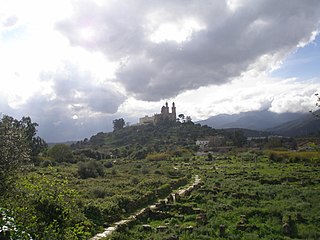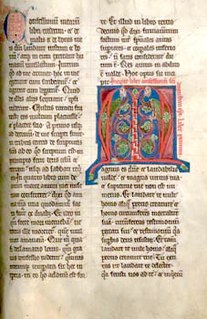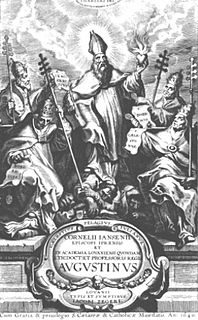
Saint Augustine of Hippo was a Roman African, early Christian theologian and philosopher from Numidia whose writings influenced the development of Western Christianity and Western philosophy. He was the bishop of Hippo Regius in north Africa and is viewed as one of the most important Church Fathers in Western Christianity for his writings in the Patristic Period. Among his most important works are The City of God, De doctrina Christiana and Confessions.

Jansenism was a theological movement, primarily in France, that emphasized original sin, human depravity, the necessity of divine grace and predestination. The movement originated from the posthumously published work of the Dutch theologian Cornelius Jansen, who died in 1638. It was first popularized by Jansen's friend Abbot Jean du Vergier de Hauranne, of Saint-Cyran-en-Brenne Abbey, and, after du Vergier's death in 1643, was led by Antoine Arnauld. Through the 17th and into the 18th centuries, Jansenism was a distinct movement away from the Catholic Church. The theological centre of the movement was the convent of Port-Royal-des-Champs Abbey, which was a haven for writers including du Vergier, Arnauld, Pierre Nicole, Blaise Pascal and Jean Racine.

Hippo Regius is the ancient name of the modern city of Annaba, in Algeria. Hippo Regius was a Phoenician, Berber, and Roman city in present-day Annaba Province, Algeria. It was the locus of several early Christian councils and home to the philosopher and theologian Augustine of Hippo.
A hippo or hippopotamus is either of two species of large African mammal which live mainly in and near water:

Confessions is the name of an autobiographical work, consisting of 13 books, by Saint Augustine of Hippo, written in Latin between AD 397 and 400. The work outlines Saint Augustine's sinful youth and his conversion to Christianity. Modern English translations of it are sometimes published under the title The Confessions of Saint Augustine in order to distinguish the book from other books with similar titles. Its original title was Confessions in Thirteen Books, and it was composed to be read out loud with each book being a complete unit.

Philosophical anthropology, sometimes called anthropological philosophy, is a discipline dealing with questions of metaphysics and phenomenology of the human person, and interpersonal relationships.
The Synod of Hippo refers to the synod of 393 which was hosted in Hippo Regius in northern Africa during the early Christian Church. Additional synods were held in 394, 397, 401 and 426. Some were attended by Augustine of Hippo.
De mirabilibus sacrae scripturae is a Latin treatise written around 655 by an anonymous Irish writer and philosopher known as Augustinus Hibernicus or the Irish Augustine.
Saint Prosper may refer to:

Augustine is a masculine given name derived from the Latin word augere, meaning "to increase." The Latin form Augustinus is developed from Augustus which means "venerable" and was a title given to Roman emperors. Saint Augustine of Hippo was a significant early Christian theologian and Doctor of the Church and his prominence in Catholic and Protestant theology contributed to the given name's spread across Europe and into further continents through evangelism.

Augustinian Studies is a peer-reviewed academic journal devoted to the study of Augustine of Hippo. Its primary focus is the study of Augustine himself, as viewed from various theological, philosophical, and historical perspectives. Articles concerned more broadly with the study of Augustine, such as studies of other persons, groups, or issues in Augustine's time, may also be included. The journal also publishes the annual Saint Augustine Lecture, given each Fall at Villanova University. A special double issue of Augustinian Studies, containing essays on Augustine's City of God, was published in 1999. The journal's editor-in-chief is Jonathan P. Yates, who replaced Allan D. Fitzgerald in 2012. Augustinian Studies is published by the Philosophy Documentation Center, in cooperation with the Augustinian Institute at Villanova University. All issues are available online.
Karla Pollmann is a professor of Classics and head of the School of Humanities at the University of Reading. Her research covers Classical to Late Antiquity, patristics, the history of exegesis and hermeneutics, and the thought of Augustine of Hippo and its reception. She studied Classics, Divinity, and Education at the Universities of Tübingen, Munich, Cambridge, and Bochum, receiving her PhD in Classics from the Ruhr University Bochum in 1990.
The Augustinus-Lexikon is a trilingual scholarly encyclopedia under the editorship of Cornelius Petrus Mayer, Robert Dodaro, and others that has as its subject matter the life and works of St Augustine of Hippo. It is a project of the Academy of Sciences and Literature in Mainz and is in the process of being published over a number of years by Schwabe AG, a publishing house in Basel the activities of which extend over five centuries. Pope Benedict XVI is known to be among the admirers and users of this work.
Robert J. Dodaro, OSA is an American priest of the Catholic Church. He is a specialist in the writings of St Augustine of Hippo.

The statue of Augustine of Hippo, or the statue of Saint Augustinus, is an outdoor sculpture by Jeroným Kohl, installed on the north side of the Charles Bridge in Prague, Czech Republic.
Optatus of Thamugadi was, from 388 to 398, a donatist bishop in the city of Thamugadi (Timgad) in the Roman province of Numidia. He was an important subject in the anti-donatistic polemic of Augustine, who was at that time a bishop in Hippo Regius and who called him evil.










